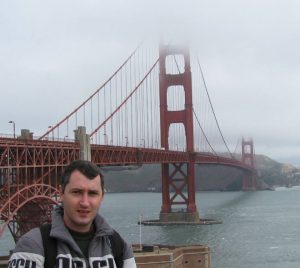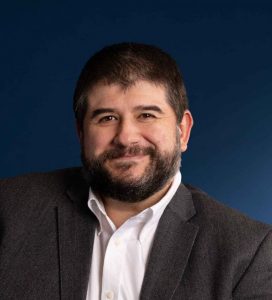
THE PHYSICS GRADUATE PROGRAM invites everyone to the seminar:
Analytically Solvable Problems in Quantum Mechanics and SWKB Quantization Condition
Yuta Nasuda
Tokyo University of Science
Abstract:
The Schrödinger-type equation appears not only in quantum mechanics but also in every corner of physics. It has long been studied what the basic feature of solvable potentials is, and how one solves the equation with those potentials analytically. Today we know infinitely many solvable potentials, but we still have no whole notion of the solvability of the Schrödinger equation. In this seminar, we first review several essential concepts in the solvability of the Schrödinger equation: factorization of Hamiltonian, shape invariance, and so on. Then we introduce the SWKB quantization condition, which is relevant to the solvability of the Schrödinger equation. We apply the condition to several solvable problems and show how they are closely connected.
Date: November 11, 2022 – (friday) – Time: 10:15 a.m.
Local: Auditório do Departamento de Física

THE PHYSICS GRADUATE PROGRAM invites everyone to the seminar:
Optical spectroscopy: from a luminescent molecule to working OLED devices
MSc Larissa Gomes França
Department of Physics , Durham University – UK
Abstract:
Organic light-emitting diodes (OLEDs) have attracted tremendous interest from the luminescent display industry over the last years. Nowadays, this technology is already a part of peoples’ lives as being used in everyday items such as in mobile phones and televisions. Using organic semiconductors instead of the more traditional inorganic (i.e. GaN, InGaN, GaAs, etc.) introduces many technological advantages. Among them are flexibility, very low thickness of final luminescent displays as well as possibility to produce transparent displays and luminaries. In an OLED device, applied voltage bias induces injection of electrons and holes through the device cathode and anode, respectively. The charge carriers are transported through the device and migrate to the emissive layer where they recombine, generating light. Spin statistics based on the spin states of holes and electrons undergoing recombination leads to a 1:3 ratio between multiplicities of thus produced excited states: singlets and triplets. Considering that often triplet states do not contribute to the luminescent output of an OLED the efficiency of these devices becomes limited to 25% of what it could be. Mechanisms that enable turning non-emissive triplet states into luminescent singlets will be discussed in this talk. Key parameters to maximise efficiency of these mechanisms allowing 100% utilisation of all electron-hole recombination will also be covered.
Date: November 4, 2022 – (friday) – Time: 10:15 a.m.
Local: Auditório do Departamento de Física
The Graduate Program in Physics of UFSC makes public the admission process’s notice to the Master and PhD programs entrance at the semester 2023/1.
Registration will be made up October 31, 2022 until 5 pm on November 18, 2022, The PPGFSC regards the grade of the Brazilian Unified Exam of Physics Graduate Courses (Exame Unificado de Pós-Graduações em Física – EUF) to the entrance at the master and PhD programs.
Click here to access the admission process website of the PPGFSC/UFSC
Below is the link to access the result of the PPGFSC / UFSC Simplified Selection Process for admission the doctoral program in the semester 2022/2.
Results
The candidates who receive a scholarship will be informed after the Scholarship Committee meeting.

THE PHYSICS GRADUATE PROGRAM invites everyone to the seminar:
Insights into Publishing at the Nature Portfolio, Open Access, and Demystifying the Editorial Process
Dr. Gustavo Tontini
Associate Editor, Nature Communications-Springer Nature
Abstract:
Dr Gustavo Tontini is an Editor at Nature Communications, an open access, multidisciplinary journal dedicated to publishing high-quality impactful research in all areas of the biological, health, physical, chemical, and Earth sciences. In this talk, we’re going to discuss about submitting research to journals at the Nature Portfolio, how editorial criteria are established, and many aspects of the editorial process in handling manuscripts, assessing research, and guiding manuscripts through peer-review.
Date: October 21, 2022 – (friday) – Time: 10:15 a.m.
Local: Auditório do Departamento de Química
The Graduate Program in Physics of the Federal University of Santa Catarina – UFSC – announces the list of the approved applications to the Simplified Admission Process entrance at the semester 2022/2.
Click here and have access to the registered candidates list and their respective situation in the admission process.
Period for appealing the application decision: until October 14, 2021, at 17:00 pm (UTC-3).

THE PHYSICS GRADUATE PROGRAM invites everyone to the seminar:
Gemini NIFS survey of feeding and feedback processes in nearby active galaxies: stellar populations
Prof. Rogério Riffel
Departamento de Astronomia, UFRGS
Abstract:
Active Galactic Nuclei (AGN) characterize a critical phase in galaxy evolution in which its nuclear supermassive black hole (SMBH) is being fed due to gas accretion onto the nuclear region. The AGN feeding and feedback processes are believed to couple the growth of the SMBHs and their host galaxies and are claimed to be responsible for the correlation between the mass of the SMBH and that of the galaxy bulge. The co-evolution scenario and the gas feeding in the inner kiloparsec of galaxies when they are in the active phase imply that the galaxy bulge grows in consonance with the SMBH. Over the last few years, our team has undertaken a major observational effort to understand this co-evolution by recovering the spatially resolved star formation history and studying the stellar kinematics of the inner few tens parsecs of galaxies. To this purpose we are applying an updated version of the STARLIGHT code to Gemini Near-infrared Integral Field Spectrograph (NIFS) data-cubes of nearby Seyfert galaxies. I will discuss these results in this talk.simulations . Unambiguous evidence that ad hoc molecular design enables the electron charge carriers to be freed from both internal and external disorder to ultimately reach band-like transport is provided.
Date: September 30, 2022 – (friday) – Time: 10:15 a.m.
link to access the youtube channel: https://youtu.be/6PGLdkn8_2Q
The Graduate Program in Physics of UFSC makes public the simplified admission process call to the PhD program entrance at the semester 2022/2.
Registration will be made up September 19, 2022 until 5 pm on October 07, 2022. The PPGFSC takes into account the grade of the Brazilian Unified Exam of Physics Graduate Courses (Exame Unificado de Pós-Graduações em Física – EUF).
Click here to access the admission process website of the PPGFSC/UFSC.
The Physics Graduate Program invites everyone to:
Defense of Doctoral Thesis
Antônio Crispim Lourenço
GENUINE MULTIPARTITE CORRELATIONS IN SYSTEMS INVARIANT BY PARTICLE PERMUTATIONS
Defense Committee:
Prof. Dr. Eduardo Inacio Duzzioni (president) – (UFSC/FSC)
Prof. Dr. Marcos Cesar de Oliveira (external member) – UNICAMP
Prof. Dr. Fernando Roberto de Luna Parisio Filho (external member) – UFPE
Prof. Dr. Marcelo Henrique Romano Tragtenberg (local member) – UFSC/FSC
Prof. Dr. Celso Jorge Villas-Bôas (supplementary member) – UFSCar
Prof. Dr. Lucas Nicolao (supplementary member) – UFSC/FSC
Date: September 19, 2022 – monday – Times: 2:00 pm – Place: sala virtual da Conferência Web da Rede Nacional de Ensino e Pesquisa (RNP)
Virtual room access link: https://conferenciaweb.rnp.br/webconf/antonio-crispim

THE PHYSICS GRADUATE PROGRAM invites everyone to the seminar:
Charge transport in organic semiconductor: From principles to devices.
Prof. Emanuele Orgiu
Université du Québec – Canada
Abstract:
Charge transport in organic semiconductors is notoriously extremely sensitive to the presence of disorder, both internal and external (i.e., related to interactions with the dielectric layer), especially for n-type materials. Internal dynamic disorder stems from large thermal fluctuations both in intermolecular transfer integrals and (molecular) site energies in weakly interacting van der Waals solids and sources transient localization of the charge carriers. The molecular vibrations that drive transient localization typically operate at low-frequency (<a-few-hundred cm−1), which makes it difficult to assess them experimentally. Hitherto, this has prevented the identification of clear molecular design rules to control and reduce dynamic disorder. In addition, the disorder can also be external, being controlled by the gate insulator dielectric properties. During the seminar, I will give a few examples of charge transport in very closely related molecular organic semiconductors using a combination of temperature-dependent inelastic neutron scattering and photoelectron spectroscopy corroborated by electrical measurements, theory, and simulations . Unambiguous evidence that ad hoc molecular design enables the electron charge carriers to be freed from both internal and external disorder to ultimately reach band-like transport is provided.
Date: September 23, 2022 – (friday) – Time: 10:15 a.m.
Local: Auditório do Departamento de Química












